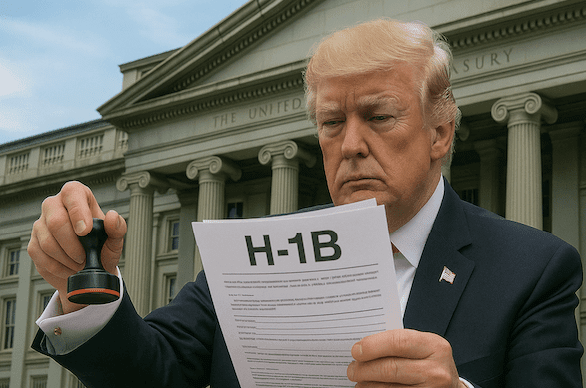
U.S. President Trump suddenly announced on the evening of September 19 that starting from September 21, a fee of $100,000 per person per year would be charged to all H-1B visa holders. This policy quickly sparked strong reactions from the technology and finance industries, foreign governments such as India and South Korea, as well as a large number of visa holders. Many are concerned that the U.S. will lose the high-skilled international talent it has long relied on, putting tens of thousands of families in distress.
H-1B Visa Overview: The Gateway for High-Tech Talent in the United States
The H-1B visa is a non-immigrant visa program implemented in the United States since the 1990s, specifically designed for foreign professionals, particularly high-skilled workers in fields such as technology, engineering, mathematics, and finance.
Annual cap: Currently, about 85,000 slots are issued each year (with 20,000 reserved for those who obtain a master's or doctoral degree in the U.S.).
Main source countries: India has long accounted for over 70%, followed by China.
Employer dependence: Tech giants in Silicon Valley such as Amazon, Microsoft, Google, Apple, and Wall Street financial institutions heavily rely on this visa to fill the STEM talent gap.
Against the backdrop of a long-standing shortage of STEM talent in the U.S., the H-1B visa has become an important channel for sustaining innovation, research and development, and competitiveness. Now, Trump's new policy is seen as a fundamental challenge to this system.
Tech giants sound the alarm: H-1B employees urgently return to the U.S.
Trump's new policy is equivalent to directly targeting these companies' 'talent artery'. Amazon's internal immigration team urgently notified employees to require all H-1B and H-4 visa holders to stay in the U.S.; those overseas must return by September 21 at 12:01 AM.
JPMorgan's law firm issued a memo advising employees to suspend international travel. Microsoft also issued a warning, stating that if they do not return to the U.S. by the deadline, their visa status may be jeopardized.
The H-1B visa, which U.S. companies rely on the most, may become a heavy burden.
As of the end of June 2025, Amazon had over 14,000 H-1B employees, the highest in the U.S.; Microsoft, Meta, Apple, and Google each have over 4,000 holders.
If according to the new rules, each visa employee will require companies to pay an additional $100,000. For companies relying on foreign technical talent, this will create enormous financial pressure, potentially affecting hiring plans and R&D investments, thereby weakening the U.S.'s competitive edge in the global tech race.
Indian and South Korean governments: concerned about innovation being stifled.
The Indian Ministry of External Affairs immediately expressed that it is studying the impact of this policy and emphasized that the U.S.-India industries share common interests in innovation. India further pointed out that this measure could have a 'humanitarian impact' on immigrant families and called on the U.S. to properly handle family reunification issues.
The South Korean Ministry of Foreign Affairs stated that it will assess the potential impact of this policy on South Korean companies and high-skilled workers. For both countries, the H-1B visa has always been an important bridge for promoting the movement of technical talent, but it may now become a new bottleneck.
Public opinion is divided: panic, anger, and support coexist.
H-1B visa holders are in panic.
On the social platform X, a large number of H-1B visa holders expressed anxiety and fear. As Indian professionals account for about 71% of H-1B visas, many described themselves as hurriedly returning to the U.S., with airports crowded with immigrant families preparing to return before the deadline.
Another major concern is the financial burden: for entry-level H-1B engineers with salaries below $80,000, an annual fee of $100,000 is simply unaffordable, with a three-year visa costing up to $300,000, making renewal or new applications nearly impossible.
Criticism is rising: fundamentally a protection fee.
Many users criticized this policy as 'reckless' and 'unfair', arguing that it punishes skilled workers and undermines the international talent base on which the U.S. tech industry relies. Some Indian professionals even pointed out that the policy has discriminatory undertones, questioning whether the Trump administration targets specific groups. Immigration experts also raised legal concerns on X, describing this fee as a 'protection fee', predicting future judicial challenges.
Supporters believe in protecting domestic workers.
On the other hand, some American netizens support the new policy. They believe it will force companies to examine whether they truly need foreign workers and prioritize hiring Americans. Some conservative commentators even praised Trump's approach as 'resetting the labor market' to prevent foreign talent from taking domestic opportunities.
Some netizens are concerned that U.S. innovation will be hindered as a result, while countries like India may benefit from the repatriation of talent; others jokingly suggest that this policy will 'make immigration lawyers billionaires'. Some tech advocates are calling for exemptions for startups or key positions to avoid impacting competitiveness.
The White House has not yet responded to external doubts, and markets and governments around the world are still waiting for further details. The legal community generally expects this policy to face large-scale litigation challenges.
This article: H-1B visa storm! Trump announces an annual fee of $100,000, Amazon and Microsoft urgently order employees to return to the U.S. First appeared on Chain News ABMedia.
